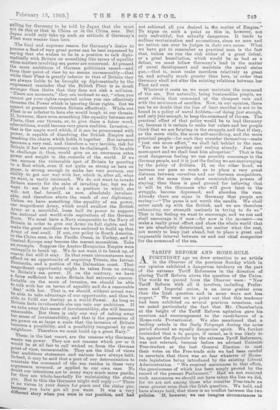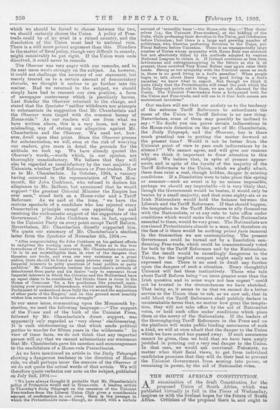TARIFF REFORM AND HOME-RULE.
AFORTNIGHT ago we drew attention to an article • in the Observer of the previous Sunday which in our opinion exhibited a dangerous tendency on the part . of the extreme Tariff Reformers in the direction . of placing Tariff Reform above the question of the Union. The words we quoted from the Observer were : " Now Tariff Reform with all it involves, including Prefer- ence and Imperial union, is an issue greater even than the Irish question and in some ways not less urgent." We went on to point out that this tendency' had been exhibited on several previous occasions; and we noted particularly the fact that Mr. Chamberlain at the height of the Tariff Reform agitation gave his. sanction and encouragement to the candidature of a Home-rule Protectionist. We also mentioned that a.• leading • article in the Daily Telegraph during the same period showed an equally dangerous spirit. We further contended that IL to quoque, if raised, as it was likely to be, against the Spectator by the extreme Tariff Reformers, was not relevant, because before we advised Unionist Free-traders at the last General Election to cast. their votes on the Free-trade side we had been careful to ascertain that there was no fear whatever of Home- rule legislation being introduced by the existing Liberal Administration. " We received assurances to that effect, the genuineness of which has been amply proved by the. record of the present Parliament." Had we not received such assurances we should not have taken the line we did, for we are not among those who consider Free-trade an issue greater even than the Irish question. We hold, and have always held, that there is no conflict between the two policies. If, however, we can imagine circumstances in which we should be forced to choose between the two, we should certainly choose the Union. A policy of Free- trade could be of no avail in a ruined country, and the dissolution of the Union must lead to national ruin. There is a, still more potent argument than this. Blunders in the matter of fiscal policy, though very difficult to remedy, might conceivably be put right. If the Union were once dissolved, it could never be remade.
The Observer was very angry with our remarks, and in its next issue wrote strongly on the subject. As, however, it could not challenge the accuracy of our statement, but merely treated us to a certain amount of denunciatory rhetoric, we thought it useless to go further into the matter. Had we returned to the subject, we should simply have had to reassert our own position, a form of newspaper controversy which is peculiarly barren. Last Sunday the Observer returned to the charge, and stated that the Spectator " neither withdraws nor attempts to substantiate its suggestion that Mr. Chamberlain and the Observer were tinged with the common heresy of Home-rule." As our readers will see from what we have written above, this is a very loose, not to say misleading, way of stating our allegation against Mr. Chamberlain and the Observer. We need not, how- ever, dwell upon that point. Since the Observer presses for substantiation, we will, even at the risk of wearying our readers, give more in detail the grounds for the attitude we took up. We have already quoted the Observer's words,—words which, in our • opinion, are thoroughly unsatisfactory. We believe that they will also be regarded as unsatisfactory by the vast majority of Unionists, whether Tariff Reformers or Free-traders. Now as to Mr. Chamberlain. In October, 1904, a vacancy having occurred in the representation of West Mon- mouth, Sir John Cockburn, who refused to declare his allegiance to Mr. Balfour, but announced that he would support " the greatest Colonial Minister the Empire has ever seen," stood both as a Home-ruler and a Tariff Reformer. As we said at the time, " we have the curious spectacle of a candidate who has rejected every Conservative principle except one appealing for and receiving the enthusiastic support of the supporters of the Government." Sir John Cockburn was, in fact, opposed to the Unionist Party on every point except Tariff Reform. Nevertheless, Mr. Chamberlain directly supported him. We quote our summary of Mr. Chamberlain's election letter from the Spectator of November 5th, 1904 :— " After congratulating Sir John Cockburn on his gallant efforts to enlighten the working mon of South Wales as to the true inwardness of the Fiscal controversy, Mr. Chamberlain continues 'It is to me unintelligible that, in view of the dangers that threaten our trade, and even our very existence as a great nation, there should be found so many persons ready to sacrifice Imperial interests to petty questions of local politics or party ambition.' Mr. Chamberlain realises the candidate's attitude of detachment from party and his desire 'only to represent those Imperial interests in which the Colonies and the Motherland have an equal claim to be considered,' but thinks there is room in the House of Commons 'for a few gentlemen like yourself, main- taining your personal independence, whilst assisting the British Parliament to understand more fully the views and the aspirations of other parts of the Empire,' and on this ground most heartily wished him success in his arduous struggle."
In our same issue, commenting upon the Monmouth by- election, we used the following language :—" The support of the Times and of the bulk of the Unionist Press, followed by Mr. Chamberlain's direct support, was apparently only regarded as 'very clever' electioneering. It is such electioneering as that which sends political parties to wander for fifteen years in the wilderness." In view of these facts, we do not think that any impartial person will say that we cannot substantiate our statement that Mr. Chamberlain gave his sanction and encouragement to the candidature of a Home-rule Protectionist.
As we have Mentioned an article in the Daily Telegraph showing a dangerous tendency in the direction of Home- rule, we shall perhaps incur the censure of the Observer if we do not quote the actual words of that article. We will therefore quote verbatim our note on the subject, published on July 2nd, 1904 :— "Wo have always thought it probable that Mr. Chamberlain's policy of Protection would and in Home-rule. A leading article in Thursday's Daily Telegraph on the secession of the Unionist Free-traders from the Liberal Union Club gives a considerable savant of ooniirmation.to our view. Here is the passage in which the Protectionists raise—though, no doubt, with a certain amount of 'crocodile tears '—the Home-rule flag They them- selves [i.e., the Unionist Free-traders], at the bidding of the Duke, while professing their devotion to the Union, put Cobdenism before Unionism: but there is a large and growing number of politicians, who, likewise professing devotion to the Union, put Fiscal Reform before Unionism. There is an unsuspectedly large number of Tories whose sympathy with Home Rule was scotched but not absolutely killed by the methods adopted by various National Leagues to obtain it. If Ireland continues as free from lawlessness and outragemongering in the future as she is at present, these scotched Tory Home Rulers may again raise their heads. Strong as our sympathy with the Unionist cause as such is, there is no good living in a fool's paradise.' When people begin to talk about there being no good living in a fool's paradise,' we know what to expect. But though we think it quite likely that the Protectionists, will tread the path which the Daily Telegraph points out to them, we are not alarmed for the Union. The Unionist Free-traders form a bodyguard both for the Union and Free-trade, and will see to it that both causes are maintained inviolate."
Our readers will see that our anxiety as to the tendency of the extreme Tariff Reformers to subordinate the cause of the Union to Tariff Reform is no new thing. Nevertheless, some of them may possibly be inclined to say : " No doubt you can prove certain indiscretions in the Home-rule direction on the part of Mr. Chamberlain, the Daily Telegraph, and the Observer, but is there much practical use in putting the matter forward at the present time ? Would it not be better from the Unionist point of view to pass such indiscretions by in silence ? " We cannot agree, and will give our reasons why we think it important to draw attention to this subjeet. We believe that, in spite of present appear- ances, and in spite of the loyalty of the majority of the Tariff Reformers to the Union, which we gladly admit, there does exist a real, though hidden, danger in existing conditions. If a Dissolution were to take place this spring or summer—such an event is by no means impossible, perhaps we should say improbable—it is very likely that, though the Government would be beaten, it would only be beaten by a small majority, and that some eighty-six or so Irish Nationalists would hold the balance between the Liberals and the Tariff Reformers. If that should happen, the temptation to the Tariff Reformers to ally themselves with the Nationalists, or at any rate to take office under conditions which would make the votes of the Nationalists essential to them, would be very great. The Nationalists are convinced Protectionists almost to a man, and therefore on the face of it there would be nothing prima facie immoral in the transaction we are contemplating. The present Government could be turned out by a Resolution eon- demning Free-trade, which could be conscientiously voted for both by the Tariff Reformers and by the Nationalists. Yet the result would be exceedingly dangerous to the Union, for the implied compact might easily end in an expressed one. There is no need to dwell any further upon the dangers of such a situation. Every thoughtful Unionist will feel them instinctively. Those who talk about Tariff Reform being " au issue greater even than the Irish question and in some veqs not less urgent could not be trusted in the circumstances we have sketched. That being so, it seems to us that we cannot do a better • service to the Union than to ask, as we now ask, that in cold blood the Tariff Reformers shall publicly declare in unmistakable terms that, no matter how great the tempta- tion, they will not take office by the aid of Nationalist votes, or hold such office under conditions which place them at the mercy of the Nationalists. If the leaders of the thoroughgoing Tariff Reformers in the Press and on the platform will make public, binding assurances of such a kind, we will at once admit that the danger to the Union which we have noted has passed away. If such assurances oaanot be given, then we hold that we have been amply justified in pointing out a very real danger to the Union. In that case, we would ask convinced Unionists, no matter what their fiscal views, to get from individual candidates promises that they will do their best to prevent the Unionist Government from coming into power, or remaining in power, by the aid of Nationalist votes.










































 Previous page
Previous page